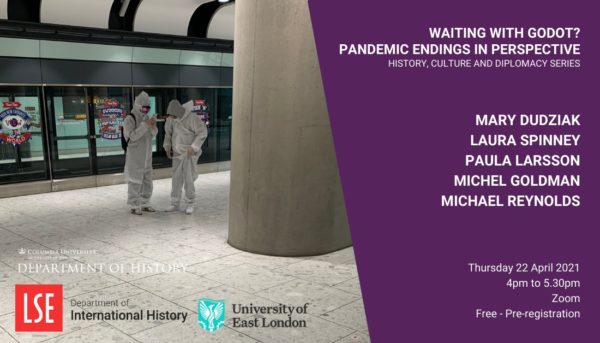Recording: https://bit.ly/3sWVIeg
More information: https://www.lse.ac.uk/International-History/Events/2021/waiting-with-godot
Hosted by the Department of International History, LSE

I3h
The seminar will use the historical context to address events and conditions that may influence the way in which COVID-[20]19 both concludes and lingers in 2021-2022 and beyond. “No matter how eloquently historical ‘endings’ are proclaimed and how sympathetically we may listen, what seems most striking is the inability to connect these endings to any pattern of meaning,” wrote Paul Corcoran in “Historical Endings: Waiting with Godot,” published in 1989 as the Cold War was beginning to end. On the cultural front, in the midst of 2020, a Scottish rock band, made famous by their first single, “Instant History,” released the album, A Celebration of Endings. What are the implications of endings that are framed as “instant” and how do events linger?
Mary Dudziak, Griggs Candler Professor of Law, Emory University School of Law, author of War Time and Cold War Civil Rights, will open with her reflections on COVID in the context of her work on armed conflict and the indeterminate endings of global warfare and the dialogue between national policy and international relations. Laura Spinney, author of Pale Rider: The Spanish Flu of 1918 and How It Changed the World, will discuss the final section of her book, “The Post-Flu World” and the conclusion of the 1918 Spanish flu in the context of 1919-1920. Paula Larsson, vaccine historian at Oxford University, will discuss the idealized narrative of vaccines as the resolution and end of pandemics, and the complex realities of vaccine roll-out, popular hesitancy, and resistance. The legal and historical context sets the stage for Michel Goldman, who will address the meaning of endings, interdisciplinary cooperation, and how we learn from past crises to address the future.
